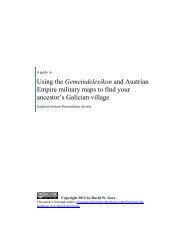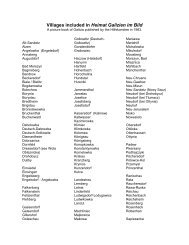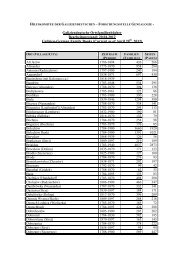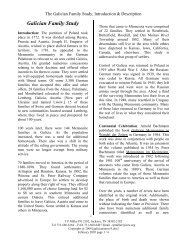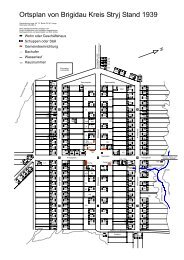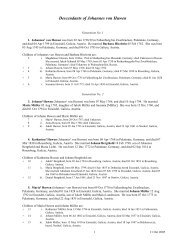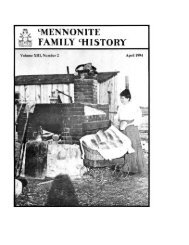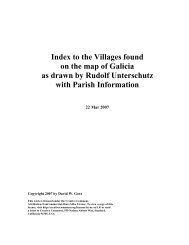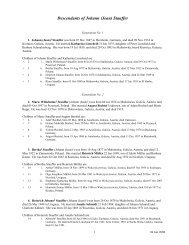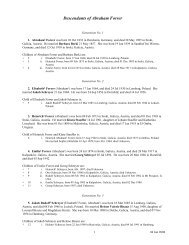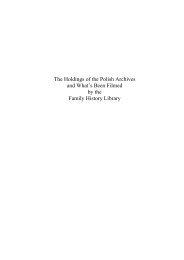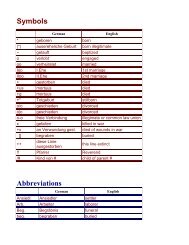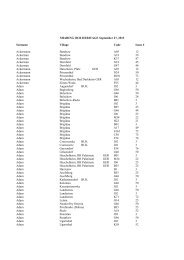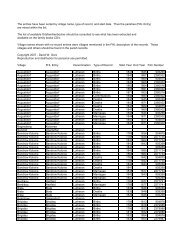All in the [Rupp] family - Galizien German Descendants
All in the [Rupp] family - Galizien German Descendants
All in the [Rupp] family - Galizien German Descendants
You also want an ePaper? Increase the reach of your titles
YUMPU automatically turns print PDFs into web optimized ePapers that Google loves.
Along <strong>the</strong> Galician Grapev<strong>in</strong>e 1 April 2006<br />
20 November 2005 to 1 April 2006<br />
Our website address is<br />
http://www.galiziengermandescendants.org/Mennonite/Mennonite.htm<br />
Please refer to this site for <strong>the</strong> <strong>family</strong> genealogical data toge<strong>the</strong>r with latest copy of <strong>the</strong> news<br />
letter “Along <strong>the</strong> Galician Grapev<strong>in</strong>e” and o<strong>the</strong>r material relevant to Galician families.<br />
Distribution of Along <strong>the</strong> Galician Grapev<strong>in</strong>e<br />
There will no formal notification of <strong>the</strong> availability of a new issue of <strong>the</strong> news letter. It is<br />
recommended that you periodically review <strong>the</strong> web site. It is also recommended to those <strong>family</strong><br />
members that do not have home access to <strong>the</strong> <strong>in</strong>ternet that <strong>the</strong>y explore <strong>the</strong> possibility of us<strong>in</strong>g<br />
<strong>the</strong>ir local library or college if one is available. Also most elementary and high schools have<br />
access to <strong>the</strong> <strong>in</strong>ternet but personal use may be difficult to achieve.<br />
Please remit your Email address to tpmiller@ieee.org if you want to be notified about significant<br />
changes and updates. Your Email address will not be disclosed without your permission and not<br />
be used for any o<strong>the</strong>r purpose<br />
Direct mail<strong>in</strong>g of <strong>the</strong> news letter will only be sent to recipients that submitted $3.00 [per issue]<br />
<strong>in</strong> advance to <strong>the</strong> attention of Glen L<strong>in</strong>scheid. gvtl@rconnect.com<br />
The <strong>family</strong> files have been updated as of 5 October 2005. You may want to replace prior<br />
versions of your downloads with <strong>the</strong>se updates.<br />
Searchable files<br />
There 30 l<strong>in</strong>ks listed on <strong>the</strong> web home page that are searchable with an Acrobat PDF reader.<br />
The Acrobat format is used to <strong>in</strong>sure <strong>the</strong> transportability of <strong>the</strong> data files across various mach<strong>in</strong>e<br />
architectures. This reader is available off <strong>the</strong> web at no cost. There is a l<strong>in</strong>k on <strong>the</strong> home page to<br />
this reader that you may use. You must use <strong>the</strong> Acrobat reader to access <strong>the</strong> l<strong>in</strong>ked files.<br />
There are 20 surname files plus <strong>the</strong> follow<strong>in</strong>g 10 l<strong>in</strong>ks;<br />
1] Introduction and Description of <strong>the</strong> Galician Family Study;<br />
2] How to search for a <strong>family</strong> member;<br />
3] Alphabetical list of Galician <strong>family</strong> members;<br />
4] Alphabetical list of Galician recorded <strong>family</strong> deaths.<br />
5] List of updates made to <strong>the</strong> Galician Family Study data files <strong>in</strong> prior Publications.<br />
Bachman Bergthold Brubacher Ewy Forrer Hub<strong>in</strong> Jotter Kle<strong>in</strong> K<strong>in</strong>tzi Laise L<strong>in</strong>scheid Merk Miller <strong>Rupp</strong> Schmidt Stauffer<br />
ba be br ew fo hu jo kl ki la li me mj/ms rj/rh sc stja/stjo/stch<br />
Page 1/14 tpm notes [sp=spouse] [fc=<strong>family</strong> connection] [ uk=unknown]
Along <strong>the</strong> Galician Grapev<strong>in</strong>e 1 April 2006<br />
20 November 2005 to 1 April 2006<br />
6] Timel<strong>in</strong>e of Central European Historical Events of Interest to Galician researchers;<br />
7] The current issue of Along <strong>the</strong> Galician Grapev<strong>in</strong>e, a <strong>family</strong> news letter;<br />
8] View an archive of earlier editions and excerpts of <strong>the</strong> AGG news letter.<br />
9] Galician <strong>family</strong> members that settled <strong>in</strong> M<strong>in</strong>nesota;<br />
10] T P Miller’s Galician connection.<br />
Updates<br />
New <strong>in</strong>formation and corrections to <strong>the</strong> exist<strong>in</strong>g data files is always welcomed. The names and<br />
birth and death dates of <strong>the</strong> parents of spouses who marry <strong>in</strong>to <strong>the</strong> <strong>family</strong> are requested as well.<br />
Please <strong>in</strong>clude all <strong>the</strong> dates and places if known. The <strong>in</strong>formation placed on <strong>the</strong> web is privatized.<br />
Family historical <strong>in</strong>formation and personal histories are accepted for collection and <strong>in</strong>dex<strong>in</strong>g. An<br />
<strong>in</strong>dex of material available will be made available to <strong>family</strong> members via this news letter.<br />
Long term Archiv<strong>in</strong>g<br />
Arrangement has been made for <strong>the</strong> data depository of <strong>the</strong> <strong>family</strong> files at <strong>the</strong> Mennonite Library<br />
& Archive at Be<strong>the</strong>l College, North Newton, KS when <strong>the</strong> pr<strong>in</strong>cipals [T P Miller & G V T<br />
L<strong>in</strong>scheid] are unable to cont<strong>in</strong>ue <strong>in</strong> <strong>the</strong>ir genealogical efforts.<br />
Mission Statement:<br />
This newsletter endeavors to present a few <strong>in</strong>terest<strong>in</strong>g slices of life, past and present, plus<br />
genealogical data. Elements which have formed and cont<strong>in</strong>ue to form our collective heritage<br />
bequea<strong>the</strong>d us by our Galician forebears must be recalled by to each succeed<strong>in</strong>g generation.<br />
Spread <strong>the</strong> News:<br />
Please notify your <strong>family</strong> members about this web site. Remit suggestions, corrections, <strong>family</strong><br />
news items and additions to Glen or Tom. Pictures are welcome. Copies of obituaries are<br />
especially appreciated. Comments about this work product good or bad will be humbly<br />
accepted.<br />
Readers Comments<br />
Some comments have been received from <strong>family</strong> members that <strong>in</strong>dicated that <strong>the</strong>re were<br />
omissions and corrections required. However, little <strong>in</strong>formation has been received. Please<br />
forward any corrections and additions to <strong>the</strong> editor. Include all <strong>the</strong> details that are possible to<br />
provide. The data will be entered <strong>in</strong>to <strong>the</strong> master database but any publication will be privatized.<br />
Bachman Bergthold Brubacher Ewy Forrer Hub<strong>in</strong> Jotter Kle<strong>in</strong> K<strong>in</strong>tzi Laise L<strong>in</strong>scheid Merk Miller <strong>Rupp</strong> Schmidt Stauffer<br />
ba be br ew fo hu jo kl ki la li me mj/ms rj/rh sc stja/stjo/stch<br />
Page 2/14 tpm notes [sp=spouse] [fc=<strong>family</strong> connection] [ uk=unknown]
Along <strong>the</strong> Galician Grapev<strong>in</strong>e 1 April 2006<br />
20 November 2005 to 1 April 2006<br />
Please direct your Email comments to: Glen V L<strong>in</strong>scheid or T P Miller at:<br />
gvtl@rconnect.com<br />
tpmiller@ieee.org<br />
Privacy<br />
The <strong>family</strong> data presented on <strong>the</strong> WEB site is privatized. This means that <strong>the</strong><br />
birthdates and birth location associated with liv<strong>in</strong>g persons is suppressed.<br />
However, one should not use <strong>the</strong> maiden name of your mo<strong>the</strong>r for a security<br />
purpose regard<strong>in</strong>g any of your personal f<strong>in</strong>ancial accounts etc. s<strong>in</strong>ce this<br />
<strong>in</strong>formation is available.<br />
Items <strong>in</strong> this Issue:<br />
Wiscons<strong>in</strong> Become Their Home P 4-5<br />
Hope <strong>in</strong> Their Heart [part I] P 6-7<br />
Hope <strong>in</strong> Their Heart [part II] P 7-9<br />
Hope <strong>in</strong> Their Heart [part III] P 9-10<br />
An Odd Bit of History P 10<br />
Galicia after World War II P 11-13<br />
Updates P 14<br />
This current Grapev<strong>in</strong>e edition marks <strong>the</strong> fifth on-l<strong>in</strong>e issue. We are fully aware of <strong>the</strong> birth pa<strong>in</strong>s<br />
experienced along <strong>the</strong> way. We are also <strong>in</strong>terested <strong>in</strong> learn<strong>in</strong>g <strong>the</strong> number of email recipients <strong>in</strong><br />
our address book who have been able to pull copies off <strong>the</strong> Internet as <strong>the</strong>y have been posted on<br />
about a quarterly schedule.<br />
Please email ei<strong>the</strong>r of us if this has been successful for you. Our email addresses are given on <strong>the</strong><br />
Home Page. Make certa<strong>in</strong> we have your correct email address!<br />
We also encourage reader copy submissions for future issues.<br />
Thanks from Tom and Glen<br />
Bachman Bergthold Brubacher Ewy Forrer Hub<strong>in</strong> Jotter Kle<strong>in</strong> K<strong>in</strong>tzi Laise L<strong>in</strong>scheid Merk Miller <strong>Rupp</strong> Schmidt Stauffer<br />
ba be br ew fo hu jo kl ki la li me mj/ms rj/rh sc stja/stjo/stch<br />
Page 3/14 tpm notes [sp=spouse] [fc=<strong>family</strong> connection] [ uk=unknown]
Along <strong>the</strong> Galician Grapev<strong>in</strong>e 1 April 2006<br />
The Wiscons<strong>in</strong> North Woods Became<br />
Their Home<br />
Editor’s Note: This story has been extracted<br />
from <strong>the</strong> Memoirs of several authors, both<br />
Galician and non-Galician personalities<br />
who have lived with<strong>in</strong> <strong>the</strong> scope of related<br />
experiences and memories woven <strong>in</strong>to this<br />
compilation.<br />
Walter Hub<strong>in</strong> (1897-1984) speaks: I was<br />
born at Butterfield, M<strong>in</strong>nesota. My parents<br />
were Peter (1862-1942) and Ka<strong>the</strong>r<strong>in</strong>e<br />
(Bergthold) (1862-1949) Hub<strong>in</strong>. They were<br />
Austrian Mennonites and came from<br />
Neuhof, Galicia. My fa<strong>the</strong>r was <strong>the</strong> first to<br />
arrive, com<strong>in</strong>g to Butterfield <strong>in</strong> 1881. The<br />
rest of <strong>the</strong> <strong>family</strong> came <strong>in</strong> 1882. Peter and<br />
Ka<strong>the</strong>r<strong>in</strong>e were married at Butterfield <strong>in</strong><br />
1884. They had thirteen children.<br />
In June, 1899, a group of Austrians arrived at<br />
<strong>the</strong> present site of Sarona, Wiscons<strong>in</strong>, with<br />
<strong>the</strong> <strong>in</strong>tention of f<strong>in</strong>d<strong>in</strong>g a suitable location<br />
for establish<strong>in</strong>g a Mennonite religious<br />
colony under <strong>the</strong> corporate name of “The<br />
Sarona Christian Social Association. The<br />
leaders of this colony were amazed at <strong>the</strong><br />
abundance of red and white clover,<br />
bluegrass and timothy that was grow<strong>in</strong>g wild<br />
among <strong>the</strong> p<strong>in</strong>e stumps on this cut-over land<br />
They were not long <strong>in</strong> decid<strong>in</strong>g to locate<br />
here, and <strong>the</strong>y were a different type of<br />
Mennonite from <strong>the</strong> groups which settled at<br />
Hayward and Barron, WI. They didn’t wear<br />
uniforms, and <strong>the</strong>y loved to dance!<br />
Articles of Incorporation were drawn up<br />
and a president (Abraham Hiebert) was<br />
appo<strong>in</strong>ted. When asked, “Is your colony<br />
20 November 2005 to 1 April 2006<br />
complete? The response was “Oh, no! We<br />
are expect<strong>in</strong>g a great many more <strong>in</strong> <strong>the</strong><br />
spr<strong>in</strong>g, and as soon as <strong>the</strong> frost leaves <strong>the</strong><br />
ground we will build a number of houses<br />
planned just like <strong>the</strong>se.”<br />
Ano<strong>the</strong>r question followed! How much<br />
money does it take to jo<strong>in</strong> you? The<br />
response was “Just what <strong>the</strong> persons may<br />
have, be it little, noth<strong>in</strong>g, or much. Ours,<br />
you know, is a Christian association for <strong>the</strong><br />
mutual benefit of <strong>the</strong> rich and <strong>the</strong> poor<br />
alike.”<br />
“How did you happen to come here?” and<br />
“Did you look at o<strong>the</strong>r locations? “We did.<br />
We were <strong>in</strong> Wash<strong>in</strong>gton, Oregon, California,<br />
Idaho, Montana, Dakota and M<strong>in</strong>nesota.<br />
While out on one of our trips, we met a<br />
railroad agent who spoke of a large tract of<br />
laud to be found here, with suitable<br />
transportation facilities, seventy miles south<br />
of Superior, Wiscons<strong>in</strong>, and about n<strong>in</strong>ety<br />
miles east of M<strong>in</strong>neapolis and St. Paul,<br />
M<strong>in</strong>nesota.”<br />
The Sarona colony was formally organized<br />
on July 20, 1899 and <strong>the</strong> construction of two<br />
colony houses was begun. Hav<strong>in</strong>g owned<br />
farms <strong>in</strong> M<strong>in</strong>nesota, so nearly like<br />
Wiscons<strong>in</strong>, <strong>the</strong>y found but little difference <strong>in</strong><br />
ei<strong>the</strong>r soil or climate. Accustomed <strong>in</strong> a<br />
measure to <strong>the</strong> discomforts of pioneer life,<br />
<strong>the</strong> entire lack of wagon roads, or even a<br />
trail <strong>in</strong> <strong>the</strong> wild country <strong>the</strong>y had chosen,<br />
failed to have a discourag<strong>in</strong>g effect upon<br />
<strong>the</strong>m.<br />
Mr. Hiebert speaks <strong>in</strong> <strong>the</strong> highest terms of<br />
<strong>the</strong> k<strong>in</strong>dness shown <strong>the</strong>m by <strong>the</strong> railroad<br />
officials <strong>in</strong> putt<strong>in</strong>g a side track and platform<br />
Bachman Bergthold Brubacher Ewy Forrer Hub<strong>in</strong> Jotter Kle<strong>in</strong> K<strong>in</strong>tzi Laise L<strong>in</strong>scheid Merk Miller <strong>Rupp</strong> Schmidt Stauffer<br />
ba be br ew fo hu jo kl ki la li me mj/ms rj/rh sc stja/stjo/stch<br />
Page 4/14 tpm notes [sp=spouse] [fc=<strong>family</strong> connection] [ uk=unknown]
Along <strong>the</strong> Galician Grapev<strong>in</strong>e 1 April 2006<br />
<strong>in</strong>stallation for <strong>the</strong>m upon very short notice.<br />
On September 1, 1899, <strong>the</strong> first shipment of<br />
household effects, horses and cattle were<br />
unloaded. By November 1 of <strong>the</strong> same year<br />
<strong>the</strong>y had used twelve carloads of lumber and<br />
thirty-five kegs of nails <strong>in</strong> <strong>the</strong> erection of<br />
<strong>the</strong>ir large dwell<strong>in</strong>g-houses, and one large<br />
barn. In <strong>the</strong> barn, <strong>the</strong>y had twenty milk<br />
cows, n<strong>in</strong>e horses, and turkeys, geese and<br />
chickens <strong>in</strong> large numbers.<br />
Space <strong>in</strong> <strong>the</strong>ir colony houses was limited, so<br />
<strong>the</strong>y could scarcely take <strong>in</strong> any more<br />
families until spr<strong>in</strong>g. However, letters of<br />
<strong>in</strong>quiry were constantly be<strong>in</strong>g received by<br />
Mr. Hiebert, which goes to prove that <strong>the</strong><br />
helpful attitude of <strong>the</strong>se Christian bro<strong>the</strong>rs<br />
and sisters toward <strong>the</strong>ir fellow-men has been<br />
noted by people liv<strong>in</strong>g many miles from<br />
<strong>the</strong>m.<br />
They feel that <strong>the</strong>y have at last found <strong>the</strong><br />
right method of deal<strong>in</strong>g with <strong>the</strong> social<br />
question. But while <strong>the</strong>y are try<strong>in</strong>g to live a<br />
life that shows all men that <strong>the</strong>y are true<br />
children of <strong>the</strong> true God, <strong>the</strong>y do not hold<br />
that <strong>the</strong>y are exalted above <strong>the</strong>ir fellow-men.<br />
They hold that <strong>in</strong> all men <strong>the</strong>re is good, and<br />
that <strong>the</strong>y are not better than <strong>the</strong>ir less<br />
fortunate bro<strong>the</strong>r who might see religious<br />
affairs <strong>in</strong> a different light. It was <strong>the</strong>ir desire<br />
to see <strong>the</strong> entire world converted to this<br />
mode of deal<strong>in</strong>g with <strong>the</strong> question of social<br />
equality, and thus avoid all <strong>the</strong> discomforts<br />
and horrors of war.<br />
Alas! Even <strong>the</strong> best laid plans are forced to<br />
yield to <strong>the</strong> vagaries of happenstance as<br />
described by Pat (Rub<strong>in</strong>) Myron <strong>in</strong> her<br />
def<strong>in</strong>itive volume Radicals to Realists:<br />
“Unfortunately, all <strong>the</strong>ir idealistic plans for<br />
20 November 2005 to 1 April 2006<br />
Utopia came to naught after only a few<br />
months. The way, Aunt Hilda, who was 12<br />
at <strong>the</strong> time, remembered th<strong>in</strong>gs, <strong>the</strong> colony’s<br />
leader, who thought he was “more equal”<br />
than <strong>the</strong> rest, decided that he should be<br />
allotted a bigger portion of <strong>the</strong> proceeds.<br />
This did not go over too well with <strong>the</strong> o<strong>the</strong>rs<br />
who were already upset over his high<br />
handed ways. Some of <strong>the</strong>m felt that he had<br />
set himself up as k<strong>in</strong>g, with all <strong>the</strong> rest of<br />
<strong>the</strong>m, his dutiful slaves. S<strong>in</strong>ce Grandpa Peter<br />
and his <strong>family</strong> had left <strong>the</strong>ir homeland so<br />
<strong>the</strong>y would not have to “bow and scrape” to<br />
any one, <strong>the</strong>y were not about to do so <strong>in</strong> <strong>the</strong><br />
new country “<strong>the</strong> land of <strong>the</strong> free”.<br />
As a result, Sarona Colony broke up before<br />
<strong>the</strong> year 1900 was over. Each of <strong>the</strong><br />
members went separate ways, buy<strong>in</strong>g ma<strong>in</strong>ly<br />
cut-over farm land nearby. (Cut-over<br />
mean<strong>in</strong>g it had been logged by <strong>the</strong> large<br />
lumber companies many years before, and<br />
had grown up aga<strong>in</strong>). But before this, <strong>the</strong>y<br />
had to get <strong>the</strong>ir money out and it was<br />
eventually necessary to go to court to fight<br />
for it s<strong>in</strong>ce <strong>the</strong> head officer left with more<br />
than was thought to be his just share.<br />
Grandpa Hub<strong>in</strong> plead his case before Judge<br />
Mead, Aunt Hilda remembered, and got just<br />
enough money to buy 40 acres of farm land,<br />
3 miles north of Sarona, near Shell Lake,<br />
still <strong>in</strong> Washburn County.<br />
O<strong>the</strong>r people bought <strong>the</strong> Colony houses <strong>in</strong><br />
Sarona, and even though <strong>the</strong> town never<br />
grew <strong>the</strong> way our early Mennonite Utopians<br />
dreamed it would, two of <strong>the</strong> orig<strong>in</strong>al houses<br />
are still stand<strong>in</strong>g. In 1930, it was described<br />
as “a prosperous little community, located<br />
on US Hwy 53 close to <strong>the</strong> sou<strong>the</strong>rn<br />
boundary of Washburn County and<br />
overlook<strong>in</strong>g it all is <strong>the</strong> old cemetery where<br />
Bachman Bergthold Brubacher Ewy Forrer Hub<strong>in</strong> Jotter Kle<strong>in</strong> K<strong>in</strong>tzi Laise L<strong>in</strong>scheid Merk Miller <strong>Rupp</strong> Schmidt Stauffer<br />
ba be br ew fo hu jo kl ki la li me mj/ms rj/rh sc stja/stjo/stch<br />
Page 5/14 tpm notes [sp=spouse] [fc=<strong>family</strong> connection] [ uk=unknown]
<strong>the</strong>y are buried.<br />
7 January 2006 [wiscons<strong>in</strong>home]<br />
Along <strong>the</strong> Galician Grapev<strong>in</strong>e 1 April 2006<br />
There Was Hope <strong>in</strong> Their Hearts that<br />
Untouched Galicia would become <strong>the</strong><br />
Homeland They Had Dreamed About.<br />
Part I<br />
Editor’s Note: This historical account of our<br />
collective past is <strong>the</strong> work of a Ukra<strong>in</strong>ian<br />
researcher exam<strong>in</strong><strong>in</strong>g <strong>the</strong> push/pull factors<br />
lead<strong>in</strong>g to Galician colonization <strong>in</strong> <strong>the</strong> I780’s.<br />
The author is Galyna Adriana Vaculenko, with<br />
<strong>the</strong> translation by Irma Rudenko, and edit<strong>in</strong>g by<br />
Gary Bergthold and Glen L<strong>in</strong>scheid. Sequel<br />
<strong>in</strong>stallments relat<strong>in</strong>g to <strong>the</strong>se topics: I) Why did<br />
<strong>the</strong> Re<strong>in</strong> Pfalz <strong>in</strong>habitants leave <strong>the</strong>ir<br />
Mo<strong>the</strong>rland and immigrate to Galicia? 2) First<br />
settler’s view of Galicia and construction of<br />
<strong>German</strong> colonies.<br />
There are still many important facts about<br />
Galicia of which noth<strong>in</strong>g has been written.<br />
For example, it is difficult to f<strong>in</strong>d<br />
<strong>in</strong>formation about <strong>the</strong> <strong>German</strong> settlements <strong>in</strong><br />
<strong>the</strong> whole of Soviet history, <strong>in</strong> which it was<br />
completely omitted. As a result, throughout<br />
<strong>the</strong> entire existence of <strong>the</strong> Soviet<br />
government, some periods of history rested<br />
<strong>in</strong> <strong>the</strong> shady corners of <strong>the</strong> historical scene.<br />
However, it is a known fact that Galicia<br />
became a mo<strong>the</strong>rland for many foreign<br />
people and for <strong>German</strong> people <strong>in</strong> particular.<br />
I became <strong>in</strong>terested <strong>in</strong> this topic because I<br />
was born <strong>in</strong> one old town named Shchyretz<br />
which is situated a short distance from Lviv<br />
(formerly Lemberg dur<strong>in</strong>g <strong>the</strong> century our<br />
forebears lived <strong>in</strong> Galicia). This town<br />
20 November 2005 to 1 April 2006<br />
comb<strong>in</strong>ed two separate settlements whose<br />
orig<strong>in</strong> predated <strong>the</strong> <strong>German</strong> settlements.<br />
These were: 1) Ukra<strong>in</strong>ian (Ostriv); 2) Jewish<br />
(Shchyretz); plus a smaller Polish presence.<br />
Not f<strong>in</strong>d<strong>in</strong>g any Ukra<strong>in</strong>ian materials on this<br />
subject, I turned to <strong>German</strong> publications<br />
which show <strong>the</strong> essence of this historical<br />
fact. After <strong>the</strong> first partition of Poland <strong>in</strong><br />
1772, Galicia ended up <strong>in</strong> <strong>the</strong> sovereignty of<br />
<strong>the</strong> Austrian monarch under <strong>the</strong> government<br />
of <strong>the</strong> Hapsburgs.<br />
Ukra<strong>in</strong>e was economically and culturally<br />
under developed. Feudalism ruled!<br />
Agriculture was poorly developed and of<br />
low <strong>in</strong>tensity. No progressive methods<br />
applied for <strong>the</strong> improvement of rais<strong>in</strong>g and<br />
harvest<strong>in</strong>g crops. The soil belonged to a few<br />
wealthy land owners, and <strong>the</strong> peasants had<br />
to work hard <strong>in</strong> <strong>the</strong>ir owners’ fields. There<br />
was no heavy <strong>in</strong>dustry, and craftsmanship<br />
was barely developed. The Hapsburg<br />
dynasty, with its ever widen<strong>in</strong>g reach of<br />
sovereignty to more and more subord<strong>in</strong>ates,<br />
did not change, at least <strong>in</strong> <strong>the</strong> beg<strong>in</strong>n<strong>in</strong>g The<br />
traditional forms of govern<strong>in</strong>g <strong>in</strong>cluded<br />
k<strong>in</strong>gships, duchies, prov<strong>in</strong>ces and cities<br />
which it conquered. Thus, until <strong>the</strong> middle<br />
of <strong>the</strong> 18th century <strong>the</strong> Austrian Empire was<br />
a shaky and poorly coord<strong>in</strong>ated<br />
conglomerate that was often overwhelmed<br />
with crises caused by <strong>in</strong>ternal arguments or<br />
outside <strong>in</strong>terference.<br />
In 1740, Empress Maria Theresa <strong>in</strong>itiated a<br />
series of reforms and measures <strong>in</strong> order to<br />
streng<strong>the</strong>n <strong>the</strong> power of <strong>the</strong> central<br />
government. The Manifesto of 1772<br />
guaranteed <strong>the</strong> rights of free religious<br />
practices and rituals for all <strong>in</strong>habitants of <strong>the</strong><br />
newly annexed Crown land of Galicia.<br />
Bachman Bergthold Brubacher Ewy Forrer Hub<strong>in</strong> Jotter Kle<strong>in</strong> K<strong>in</strong>tzi Laise L<strong>in</strong>scheid Merk Miller <strong>Rupp</strong> Schmidt Stauffer<br />
ba be br ew fo hu jo kl ki la li me mj/ms rj/rh sc stja/stjo/stch<br />
Page 6/14 tpm notes [sp=spouse] [fc=<strong>family</strong> connection] [ uk=unknown]
Along <strong>the</strong> Galician Grapev<strong>in</strong>e 1 April 2006<br />
Moreover, <strong>the</strong>se Edicts were confirmed by<br />
Poland, Russia, Austria and Prussia<br />
underscor<strong>in</strong>g religious toleration to <strong>the</strong><br />
Protestants. That was <strong>the</strong> process whereby<br />
religious freedom was created <strong>in</strong> Galicia.<br />
Protestant merchants, artists, craftsmen and<br />
factory workers were granted un<strong>in</strong>hibited<br />
freedom to take up residence <strong>in</strong> <strong>the</strong> larger<br />
cities.<br />
The son of Maria Theresa, Franz Joseph II,<br />
ascend<strong>in</strong>g <strong>the</strong> Throne <strong>in</strong> 1780, became even<br />
a more active reformer. He was an advocate<br />
of modem European <strong>the</strong>ories of enlightened<br />
govern<strong>in</strong>g, and decided to make his tenure<br />
an example of good government. His goal<br />
was to br<strong>in</strong>g <strong>the</strong> decay<strong>in</strong>g economy of<br />
Galicia back to life, to relieve <strong>the</strong> hardships<br />
of <strong>the</strong> peasant class, to <strong>in</strong>crease <strong>the</strong><br />
effectiveness of officialdom, to improve<br />
education, and to end religious wars. <strong>All</strong><br />
<strong>the</strong>se directives were known as <strong>the</strong> “Joseph<br />
Edicts”. His proclamations gave freedom of<br />
religious practices and <strong>in</strong>dependence from<br />
<strong>the</strong> predom<strong>in</strong>ant Catholic Church to all o<strong>the</strong>r<br />
confessions, thus open<strong>in</strong>g <strong>the</strong> way for<br />
emigration to Galicia of Lu<strong>the</strong>rans,<br />
Mennonites and o<strong>the</strong>r denom<strong>in</strong>ations.<br />
<strong>All</strong>owed were privately f<strong>in</strong>anced<br />
construction of churches and schools,<br />
provid<strong>in</strong>g <strong>the</strong>re were sufficient numbers of<br />
families <strong>in</strong> <strong>the</strong> same area. Some restrictions<br />
also followed: Churches o<strong>the</strong>r than Catholic<br />
were not allowed to r<strong>in</strong>g church bells, or<br />
conduct public processions on <strong>the</strong> streets of<br />
cities and towns. <strong>All</strong> <strong>the</strong>se concessions<br />
amounted to a free road of colonization<br />
br<strong>in</strong>g<strong>in</strong>g 3,216 families to Galicia over <strong>the</strong><br />
years 1782 to 1785. Included <strong>in</strong> this number<br />
were <strong>the</strong> 28 Mennonite families of our<br />
collective forebears.<br />
20 November 2005 to 1 April 2006<br />
There Was Hope <strong>in</strong> Their Hearts that<br />
Untouched Galicia would become <strong>the</strong><br />
Homeland They Had Dreamed About.<br />
Part II<br />
Editor’s Note: The follow<strong>in</strong>g story is <strong>the</strong> 2nd<br />
<strong>in</strong>stallment of a 3 part series describ<strong>in</strong>g <strong>the</strong><br />
push/pull factors lead<strong>in</strong>g to <strong>the</strong> Galician<br />
colonization of <strong>the</strong> 1780s.<br />
In 1749 <strong>the</strong>re were big rebellions happen<strong>in</strong>g<br />
<strong>in</strong> <strong>the</strong> <strong>German</strong> Palat<strong>in</strong>ate, part of a wave of<br />
general upris<strong>in</strong>gs throughout Europe. Socioreligious<br />
tensions, outside <strong>in</strong>terferences, and<br />
a 7 year war weakened <strong>the</strong> economy of <strong>the</strong><br />
whole country. By <strong>the</strong> end of <strong>the</strong> 18th<br />
Century <strong>the</strong> Pfalz was <strong>in</strong> ru<strong>in</strong>s. The bravest<br />
<strong>in</strong>habitants were look<strong>in</strong>g for a new<br />
homeland. The ma<strong>in</strong> directions of<br />
emigration <strong>in</strong>cluded <strong>the</strong> USA, South<br />
America, Hungary (Banat), and Galicia.<br />
Professor Dr. Haberle from Heidelberg<br />
narrates <strong>the</strong> story of <strong>the</strong>se conditions: “There<br />
was not a s<strong>in</strong>gle place where public appeals<br />
would not take place. The k<strong>in</strong>dness of<br />
Joseph II was taken so gladly that it seemed<br />
<strong>the</strong> whole regional population was ready to<br />
migrate. Even wealthy families were on <strong>the</strong><br />
road, streets were full of travelers, and it<br />
looked like all <strong>the</strong> <strong>in</strong>habitants wanted to<br />
leave this area.”<br />
With words full of compassion and pa<strong>in</strong>,<br />
Pastor Fritz Seefeld wrote: “My <strong>German</strong><br />
bro<strong>the</strong>rs and sisters, and you, joyful nation<br />
of Pfalz, is your Mo<strong>the</strong>rland not dear to you<br />
any more? Why are you undertak<strong>in</strong>g this<br />
journey? Why are you look<strong>in</strong>g for a new<br />
homeland <strong>in</strong> <strong>the</strong> foreign lands among<br />
Bachman Bergthold Brubacher Ewy Forrer Hub<strong>in</strong> Jotter Kle<strong>in</strong> K<strong>in</strong>tzi Laise L<strong>in</strong>scheid Merk Miller <strong>Rupp</strong> Schmidt Stauffer<br />
ba be br ew fo hu jo kl ki la li me mj/ms rj/rh sc stja/stjo/stch<br />
Page 7/14 tpm notes [sp=spouse] [fc=<strong>family</strong> connection] [ uk=unknown]
Along <strong>the</strong> Galician Grapev<strong>in</strong>e 1 April 2006<br />
foreign peoples? Do you want to lead<br />
strangely your <strong>German</strong> way of life <strong>in</strong> a<br />
strange country? Even on <strong>the</strong> faces of young<br />
wanderers I don’t see happ<strong>in</strong>ess. On <strong>the</strong><br />
faces of older people I see a stubborn will,<br />
and <strong>the</strong> oldest cannot hide <strong>the</strong>ir tearful faces.<br />
The Pfalz survived an awful century before<br />
1780. It was as far back as dur<strong>in</strong>g <strong>the</strong> times<br />
when <strong>the</strong> fa<strong>the</strong>rs of <strong>the</strong> forefa<strong>the</strong>rs of Pfalz<br />
<strong>in</strong>habitants were leav<strong>in</strong>g for North America;<br />
but why?”<br />
Long l<strong>in</strong>es of migrants were accompanied<br />
by tears and last glances at wonderful Pfalz,<br />
where native speech was heard, where<br />
wooded mounta<strong>in</strong>s reached <strong>the</strong> skies, where<br />
v<strong>in</strong>eyards sh<strong>in</strong>ed on <strong>the</strong> hills under <strong>the</strong> sun,<br />
where <strong>the</strong> Rh<strong>in</strong>e whirled <strong>in</strong> beautiful<br />
valleys, where <strong>the</strong>y had lived <strong>the</strong>ir<br />
childhood. They took <strong>the</strong> sounds of native<br />
speech with <strong>the</strong>m, but all <strong>the</strong> rest rema<strong>in</strong>ed<br />
<strong>in</strong> <strong>the</strong>ir memories. They traveled through<br />
Heidelberg and Galbron to Stuttgart, <strong>the</strong>n<br />
through Ulm and Viden where <strong>the</strong>y received<br />
two gulden per person. Everyone received<br />
ten kreitzers for one day of travel. However,<br />
this wasn’t enough for expenses so <strong>the</strong>y<br />
added from <strong>the</strong>ir own sav<strong>in</strong>gs.<br />
While visit<strong>in</strong>g one camp of migrants <strong>in</strong><br />
Viden, <strong>the</strong> K<strong>in</strong>g consoled and supported<br />
<strong>the</strong>m, restat<strong>in</strong>g his promises aga<strong>in</strong> <strong>in</strong> <strong>the</strong><br />
midst of f<strong>in</strong>d<strong>in</strong>g strong faith and mov<strong>in</strong>g<br />
trust <strong>in</strong> <strong>the</strong> people.<br />
From Viden <strong>the</strong>y moved to Marhtal, and<br />
<strong>the</strong>n along <strong>the</strong> nor<strong>the</strong>rn route through<br />
Chehia until <strong>the</strong>y reached Bileh, <strong>the</strong> first city<br />
<strong>in</strong> Galicia. Here <strong>the</strong>y received one gulden<br />
per person. <strong>All</strong> <strong>the</strong> settlers passed through<br />
Bileh, so <strong>the</strong> records of Bileh’s customhouse<br />
provide <strong>the</strong> best data on <strong>the</strong> size of <strong>the</strong><br />
20 November 2005 to 1 April 2006<br />
migrations <strong>in</strong> <strong>the</strong> 1780s,<br />
Professor Haberle cont<strong>in</strong>ues <strong>in</strong> a similar<br />
ve<strong>in</strong>: “Be<strong>in</strong>g constantly burdened with high<br />
tax demands and devastated by <strong>the</strong> presence<br />
of numerous enemies, not protected from<br />
wander<strong>in</strong>g armed thieves, <strong>the</strong>y were forced<br />
to tolerate this emigration only to avoid<br />
greater misfortunes. If <strong>the</strong> <strong>in</strong>habitants had<br />
lived one year quietly, <strong>the</strong>y were certa<strong>in</strong> that<br />
<strong>the</strong> next year’s harvest would be taken by<br />
enemies. Pfalz was <strong>in</strong>habited by foreign<br />
troops, and agoniz<strong>in</strong>g despair was creep<strong>in</strong>g<br />
over <strong>the</strong> people <strong>in</strong> towns and villages. They<br />
suffered from fam<strong>in</strong>e. Fields were<br />
unplowed, cattle lacked forage, and soil was<br />
lack<strong>in</strong>g fertilizers. <strong>All</strong> that <strong>the</strong> people<br />
managed to grow was downtrodden by wild<br />
animals brought <strong>in</strong> by <strong>the</strong> Pr<strong>in</strong>ces dur<strong>in</strong>g <strong>the</strong><br />
hunt<strong>in</strong>g seasons. In addition to economic<br />
problems, <strong>the</strong>re was political oppression and<br />
religious persecution. For example, when<br />
<strong>the</strong> landowner changed religion, <strong>the</strong> people<br />
liv<strong>in</strong>g on his land were forced to follow his<br />
lead. One day <strong>the</strong>y would be Catholics, <strong>the</strong><br />
next <strong>the</strong>y would be Lu<strong>the</strong>ran, or <strong>the</strong>y could<br />
be converted at times even to <strong>the</strong> reformist<br />
religions. Forceful methods were employed<br />
for conversion <strong>in</strong>to a given confession. Such<br />
treatment turned people away from <strong>the</strong>ir<br />
homeland. Lack<strong>in</strong>g a peaceful life and<br />
constantly flee<strong>in</strong>g from enemies who<br />
destroyed everyth<strong>in</strong>g, people were forced to<br />
feel homeless and disconnected from <strong>the</strong><br />
peace of a land <strong>in</strong>herited from <strong>the</strong>ir parents.<br />
Both wealthy and poor people were start<strong>in</strong>g<br />
on a long journey. They were rid<strong>in</strong>g horses;<br />
some were walk<strong>in</strong>g, cart<strong>in</strong>g <strong>the</strong>ir<br />
belong<strong>in</strong>gs. They longed to work <strong>the</strong>ir land<br />
quietly and to confidently feed <strong>the</strong>ir families<br />
and survive. Why did <strong>the</strong> Rh<strong>in</strong>e-Pfalz<br />
Bachman Bergthold Brubacher Ewy Forrer Hub<strong>in</strong> Jotter Kle<strong>in</strong> K<strong>in</strong>tzi Laise L<strong>in</strong>scheid Merk Miller <strong>Rupp</strong> Schmidt Stauffer<br />
ba be br ew fo hu jo kl ki la li me mj/ms rj/rh sc stja/stjo/stch<br />
Page 8/14 tpm notes [sp=spouse] [fc=<strong>family</strong> connection] [ uk=unknown]
<strong>in</strong>habitants leave?<br />
Along <strong>the</strong> Galician Grapev<strong>in</strong>e 1 April 2006<br />
Long l<strong>in</strong>es of migrants were accompanied<br />
by tears and last glances at wonderful Pfalz,<br />
where native speech was heard, where<br />
wooded mounta<strong>in</strong>s reached <strong>the</strong> skies, where<br />
v<strong>in</strong>eyards sh<strong>in</strong>ed on <strong>the</strong> hills under <strong>the</strong> sun,<br />
where <strong>the</strong> Rh<strong>in</strong>e whirled <strong>in</strong> beautiful<br />
valleys, where <strong>the</strong>y had lived <strong>the</strong>ir<br />
childhood. They took <strong>the</strong> sounds of native<br />
speech with <strong>the</strong>m, but all <strong>the</strong> rest rema<strong>in</strong>ed<br />
<strong>in</strong> <strong>the</strong>ir memories. They traveled through<br />
Heidelberg and Galbron to Stuttgart, <strong>the</strong>n<br />
through Ulm and Viden where <strong>the</strong>y received<br />
two gulden per person. Everyone received<br />
ten kreitzers for one day of travel. However,<br />
this wasn’t enough for expenses so <strong>the</strong>y<br />
added from <strong>the</strong>ir own sav<strong>in</strong>gs.<br />
While visit<strong>in</strong>g one camp of migrants <strong>in</strong><br />
Viden, <strong>the</strong> K<strong>in</strong>g consoled and supported<br />
<strong>the</strong>m, restat<strong>in</strong>g his promises aga<strong>in</strong> <strong>in</strong> <strong>the</strong><br />
midst of f<strong>in</strong>d<strong>in</strong>g strong faith and mov<strong>in</strong>g<br />
trust <strong>in</strong> <strong>the</strong> people.<br />
From Viden <strong>the</strong>y moved to Marhtal, and<br />
<strong>the</strong>n along <strong>the</strong> nor<strong>the</strong>rn route through<br />
Chehia until <strong>the</strong>y reached Bileh, <strong>the</strong> first city<br />
<strong>in</strong> Galicia. Here <strong>the</strong>y received one gulden<br />
per 90r50n. <strong>All</strong> <strong>the</strong> settlers passed through<br />
Bileh, so <strong>the</strong> records of Bileh’s custom<br />
house provide <strong>the</strong> best data on <strong>the</strong> size of <strong>the</strong><br />
migrations <strong>in</strong> <strong>the</strong> 1780s.<br />
~~~~~~~~<br />
First Settlers View of Galicia and<br />
Construction of <strong>German</strong> Colonies<br />
Part III<br />
Editor’s Note: This is <strong>the</strong> 3rd and f<strong>in</strong>al<br />
20 November 2005 to 1 April 2006<br />
<strong>in</strong>stallment of <strong>the</strong> factors <strong>in</strong>fluenc<strong>in</strong>g <strong>the</strong><br />
orig<strong>in</strong> of Galician <strong>German</strong> village<br />
developments <strong>in</strong> <strong>the</strong> 1780s.<br />
At last <strong>the</strong> <strong>German</strong> settlers arrived <strong>in</strong><br />
Galicia! Two thousand kilometers were<br />
beh<strong>in</strong>d <strong>the</strong>m. The first colonist’s<br />
impressions of Galicia were terrible! Under<br />
Polish subjugation, Ukra<strong>in</strong>ian peasants<br />
didn’t own any land, or have many rights.<br />
Pastor Fritz Seefeld also recalls that a<br />
wealthy landowner could have a peasant<br />
killed for thirty Polish marks, less than <strong>the</strong><br />
price of an ox.<br />
The farmers practiced a primitive form of<br />
agriculture, and lived off whatever was<br />
grow<strong>in</strong>g <strong>in</strong> <strong>the</strong> field or forest. Essential<br />
goods were cheap. One needed only five<br />
gulden to buy a pair of shoes that would last<br />
for two years, or a hat good for five years.<br />
People grew hemp, weaved l<strong>in</strong>en and sewed<br />
clo<strong>the</strong>s. There were no agricultural<br />
build<strong>in</strong>gs, only primitive shops. Cattle stood<br />
<strong>in</strong> <strong>the</strong> open, often covered with snow dur<strong>in</strong>g<br />
w<strong>in</strong>ter. Vast forests extended from <strong>the</strong><br />
Carpathian Mounta<strong>in</strong>s to Lemberg (Lvov -<br />
Polish; Lviv- Ukra<strong>in</strong>ish)<br />
There were no hospitals for <strong>the</strong> country<br />
people. Professor Seefeld reports that a<br />
hospital existed <strong>in</strong> Rozdil operated by Mercy<br />
Sisters with six beds, but not for <strong>the</strong> poor.<br />
With<strong>in</strong> 100 kilometers, <strong>the</strong>re was not a<br />
s<strong>in</strong>gle doctor.<br />
The colonists brought potatoes, good grades<br />
of fruit trees, and fodder gra<strong>in</strong>s for <strong>the</strong> cattle.<br />
Carts and o<strong>the</strong>r appliances were also<br />
brought. An iron plow, as valuable as a<br />
piece of land, was <strong>in</strong>herited by sons <strong>in</strong> <strong>the</strong><br />
<strong>family</strong>.<br />
Bachman Bergthold Brubacher Ewy Forrer Hub<strong>in</strong> Jotter Kle<strong>in</strong> K<strong>in</strong>tzi Laise L<strong>in</strong>scheid Merk Miller <strong>Rupp</strong> Schmidt Stauffer<br />
ba be br ew fo hu jo kl ki la li me mj/ms rj/rh sc stja/stjo/stch<br />
Page 9/14 tpm notes [sp=spouse] [fc=<strong>family</strong> connection] [ uk=unknown]
Along <strong>the</strong> Galician Grapev<strong>in</strong>e 1 April 2006<br />
On <strong>the</strong>ir arrival <strong>in</strong> Galicia, many <strong>German</strong><br />
colonists at first resided <strong>in</strong> Ukra<strong>in</strong>ian and<br />
Jewish homes. After surviv<strong>in</strong>g a hard and<br />
severe first w<strong>in</strong>ter, <strong>the</strong>y started house<br />
construction projects. There was a<br />
construction project <strong>in</strong> Falkenste<strong>in</strong> built on<br />
<strong>the</strong> land of a former women’s monastery of<br />
sisters. This land became <strong>the</strong> property of <strong>the</strong><br />
Austrian Empire upon <strong>the</strong> partition<strong>in</strong>g of<br />
Poland. The construction was a work of<br />
precision and perfection. Falkenste<strong>in</strong> was to<br />
become a model for <strong>the</strong> <strong>German</strong> colonies <strong>in</strong><br />
Galicia. The center of <strong>the</strong> colony was <strong>the</strong><br />
<strong>in</strong>tersection of four streets that had a<br />
common park area with houses <strong>in</strong> <strong>the</strong><br />
middle. Houses were built of wood, and<br />
<strong>in</strong>side walls were made of soft wood. The<br />
wall, where <strong>the</strong> tiled stove stood, was<br />
bricked up. The o<strong>the</strong>r walls were <strong>in</strong>terlaced<br />
with adobe made of thatch and clay loam.<br />
On 24 December 1785, a treaty was made<br />
with <strong>the</strong> colonists free<strong>in</strong>g <strong>the</strong>m for<br />
citizenship and tax payments for <strong>the</strong> first<br />
twelve years. Construction of churches,<br />
schools and libraries was privately f<strong>in</strong>anced<br />
because <strong>the</strong> State had no money for <strong>the</strong>se<br />
projects. Hopes for help from <strong>the</strong> State were<br />
not realized because Austria from 1788 to<br />
1815 was <strong>in</strong> constant warfare with Turkey,<br />
France, and Russia.<br />
~~~~~~~<br />
Editor’s Summary: The conditions described<br />
<strong>in</strong> this 3 part series of Galician <strong>German</strong><br />
colonization also applied to our Galician<br />
Mennonite forebears. A real pioneer<strong>in</strong>g<br />
spirit was required to deal with <strong>the</strong> many<br />
hardships encountered dur<strong>in</strong>g early years of<br />
Galician settlement. By sheer hard work and<br />
strong will, <strong>the</strong>y were gradually able to<br />
improve <strong>the</strong>ir lot <strong>in</strong> this new Galician<br />
20 November 2005 to 1 April 2006<br />
Homeland. (These comments were not a part<br />
of <strong>the</strong> author’s text).<br />
~~~~~~~~~~~<br />
An Odd Bit of History<br />
On page 192 of Ian Frazier's extraord<strong>in</strong>ary<br />
book, Great Pla<strong>in</strong>s (Picador, 2001<br />
paperback edition), Frazier writes that<br />
several recently immigrated Mennonite<br />
elders traveled to Wash<strong>in</strong>gton to request that<br />
President Grant allow <strong>the</strong>m <strong>the</strong> same<br />
exemption from military service that <strong>the</strong>y<br />
had once had <strong>in</strong> Russia.<br />
"They were surprised to discover him<br />
surrounded by none of <strong>the</strong> pomp that<br />
surrounded <strong>the</strong> Czar. Grant met <strong>the</strong>m <strong>in</strong> a<br />
worn black frock coat and listened politely”.<br />
“As it happened General Custer was <strong>the</strong>re to<br />
see Grant at <strong>the</strong> same time. Custer, who was<br />
of <strong>German</strong> ancestry, spoke to <strong>the</strong><br />
Mennonites <strong>in</strong> <strong>German</strong> and later took <strong>the</strong>m<br />
to a play, and <strong>the</strong>y liked him - a man whose<br />
views on war could not have been more<br />
different from <strong>the</strong>ir own."<br />
In his footnotes, Frazier says almost all his<br />
<strong>in</strong>formation about <strong>the</strong> Mennonites comes<br />
from The Com<strong>in</strong>g of <strong>the</strong> Russian<br />
Mennonites by Charles H. Smith (Berne,<br />
Indiana 1927.<br />
~~~~~~<br />
God is a comedian with an<br />
audience too frightened to<br />
laugh!<br />
Voltaire<br />
Bachman Bergthold Brubacher Ewy Forrer Hub<strong>in</strong> Jotter Kle<strong>in</strong> K<strong>in</strong>tzi Laise L<strong>in</strong>scheid Merk Miller <strong>Rupp</strong> Schmidt Stauffer<br />
ba be br ew fo hu jo kl ki la li me mj/ms rj/rh sc stja/stjo/stch<br />
Page 10/14 tpm notes [sp=spouse] [fc=<strong>family</strong> connection] [ uk=unknown]
Along <strong>the</strong> Galician Grapev<strong>in</strong>e 1 April 2006<br />
Galicia after World War II<br />
By Alma (Bachmann) L<strong>in</strong>scheid<br />
Editor’s Note: This account of life<br />
experiences was related by <strong>the</strong> late Alma<br />
(Bachmann) L<strong>in</strong>scheid li 6.311141 (1922—<br />
1997). It has been <strong>in</strong>cluded <strong>in</strong> this series<br />
br<strong>in</strong>g<strong>in</strong>g to a close <strong>the</strong> movement of our<br />
<strong>family</strong> to <strong>the</strong> States from Galicia.<br />
I was born on July 11, 1922, <strong>in</strong> <strong>the</strong> little<br />
village of Neuhof, Galicia, formerly under<br />
Austrian governance, but follow<strong>in</strong>g World<br />
War I, it became a part of Poland. It was<br />
<strong>the</strong>re that I attended school eight years.<br />
In 1939, warfare of a few days duration with<br />
<strong>German</strong>y became <strong>the</strong> first of many terrify<strong>in</strong>g<br />
experiences. Dur<strong>in</strong>g <strong>the</strong> first night of this<br />
strife, <strong>the</strong> <strong>German</strong> military forces<br />
bombarded our village with mach<strong>in</strong>e gun<br />
fire and bullets whizzed <strong>in</strong> every direction.<br />
My <strong>family</strong>, of necessity, was forced to seek<br />
shelter and our chores were halted until <strong>the</strong><br />
raid subsided. On <strong>the</strong> same even<strong>in</strong>g, <strong>German</strong><br />
soldiers came to our home want<strong>in</strong>g food.<br />
The Polish soldiers fled before <strong>the</strong> <strong>German</strong><br />
troops tak<strong>in</strong>g with <strong>the</strong>m all horses, all arms,<br />
and everyth<strong>in</strong>g which was movable. At a 12mile<br />
distanced, <strong>the</strong> Polish and <strong>German</strong><br />
forces engaged <strong>in</strong> fierce combat, and <strong>the</strong><br />
entire village was afire with flames leap<strong>in</strong>g<br />
high <strong>in</strong>to <strong>the</strong> night. The destruction was so<br />
severe that villagers came to our home for<br />
refuge.<br />
The follow<strong>in</strong>g Sunday we attended church<br />
services. The same afternoon <strong>German</strong> army<br />
officers came to our door and <strong>in</strong>formed us of<br />
a decision we were forced immediately to<br />
20 November 2005 to 1 April 2006<br />
make. We were offered <strong>the</strong> choice of<br />
rema<strong>in</strong><strong>in</strong>g <strong>in</strong> our home and liv<strong>in</strong>g under<br />
Communists, or to quickly pack our<br />
possessions and flee to <strong>German</strong>y.<br />
It was a very sad decision for our <strong>family</strong> to<br />
make, but <strong>the</strong> alternatives seemed<br />
<strong>in</strong>tolerable. In order to escape from<br />
Communist tyranny we quickly packed our<br />
belong<strong>in</strong>gs which could be placed <strong>in</strong> a horse<br />
drawn wagon for <strong>the</strong> journey to where we<br />
did not know. Our cattle were also <strong>in</strong>cluded<br />
<strong>in</strong> this depart<strong>in</strong>g caravan, but left beh<strong>in</strong>d<br />
were our furniture, our mach<strong>in</strong>ery, gra<strong>in</strong> and<br />
some hogs.<br />
My parents drove <strong>the</strong> horses hitched to <strong>the</strong><br />
wagon. My grandmo<strong>the</strong>r, sisters and a<br />
bro<strong>the</strong>r traveled by bus. My uncle and I<br />
walked with <strong>the</strong> cattle. While go<strong>in</strong>g through<br />
a forest area, we became separated from our<br />
parents, but providentially we met <strong>the</strong>m<br />
aga<strong>in</strong> <strong>in</strong> <strong>the</strong> next village. At this po<strong>in</strong>t, my<br />
fa<strong>the</strong>r walked with <strong>the</strong> cattle and drove <strong>the</strong><br />
horses to our next ga<strong>the</strong>r<strong>in</strong>g po<strong>in</strong>t.<br />
Dur<strong>in</strong>g my walk with <strong>the</strong> cattle, I had worn a<br />
pair of new high-laced shoes. Fifty miles of<br />
walk<strong>in</strong>g had caused my feet to become very<br />
sore to <strong>the</strong> extent that I had to leave my<br />
<strong>family</strong> and rema<strong>in</strong> <strong>in</strong> a camp for a two-week<br />
period. There was no possibility of<br />
ma<strong>in</strong>ta<strong>in</strong><strong>in</strong>g contact with my <strong>family</strong> at that<br />
time. This was a most difficult burden to<br />
bear.<br />
Eventually my fa<strong>the</strong>r was able to locate me<br />
and he related that our cattle had been sold<br />
and that <strong>the</strong> <strong>family</strong> was prepar<strong>in</strong>g to move to<br />
ano<strong>the</strong>r camp.<br />
We rema<strong>in</strong>ed at this new location for about<br />
Bachman Bergthold Brubacher Ewy Forrer Hub<strong>in</strong> Jotter Kle<strong>in</strong> K<strong>in</strong>tzi Laise L<strong>in</strong>scheid Merk Miller <strong>Rupp</strong> Schmidt Stauffer<br />
ba be br ew fo hu jo kl ki la li me mj/ms rj/rh sc stja/stjo/stch<br />
Page 11/14 tpm notes [sp=spouse] [fc=<strong>family</strong> connection] [ uk=unknown]
Along <strong>the</strong> Galician Grapev<strong>in</strong>e 1 April 2006<br />
Two weeks. Follow<strong>in</strong>g this stay we were<br />
placed on a small farm by <strong>the</strong> <strong>German</strong><br />
authorities. This was to be our abode dur<strong>in</strong>g<br />
<strong>the</strong> long w<strong>in</strong>ter. In <strong>the</strong> spr<strong>in</strong>g of that year,<br />
we were placed on a larger farm which was<br />
furnished with equipment left beh<strong>in</strong>d by<br />
flee<strong>in</strong>g Poles. In this community my fa<strong>the</strong>r<br />
had a bro<strong>the</strong>r and sister who had settled<br />
<strong>the</strong>re. While <strong>in</strong> this location we attended <strong>the</strong><br />
Lu<strong>the</strong>ran Church whenever this was<br />
possible.<br />
<strong>All</strong> <strong>the</strong> young girls and boys were<br />
automatically members of Hitler’s party<br />
organization, and on Sunday morn<strong>in</strong>gs we<br />
were forced to demonstrate our allegiance to<br />
Hitler or face <strong>in</strong>carceration. Upon arriv<strong>in</strong>g at<br />
<strong>the</strong> church for Good Friday services, <strong>the</strong><br />
police stood <strong>in</strong> front of <strong>the</strong> church door and<br />
<strong>in</strong>structed us <strong>the</strong>re would be no church<br />
service. We were to return home and work<br />
or be imprisoned,<br />
One summer day a pastor came from Danzig<br />
to see us- We <strong>in</strong>vited our aunt and uncle to<br />
share communion with our <strong>family</strong> and guest.<br />
Our aunt also belonged to a Hitler group so<br />
did not jo<strong>in</strong> us for communion. Afterward,<br />
she was severely <strong>in</strong>terrogated and sternly<br />
warned not to attend any such meet<strong>in</strong>g<br />
without <strong>in</strong>form<strong>in</strong>g party officials. Our fa<strong>the</strong>r<br />
was also reprimanded and threatened with<br />
imprisonment. We were told it was unlawful<br />
to have any secret meet<strong>in</strong>gs. This location<br />
rema<strong>in</strong>ed our home for five years, all <strong>the</strong><br />
while under Hitler’s rule.<br />
Then word came for us to leave this place<br />
aga<strong>in</strong> as Communist forces were mov<strong>in</strong>g<br />
closer and <strong>the</strong> <strong>German</strong> forces were<br />
retreat<strong>in</strong>g. We were not told where to go, but<br />
just to leave. The <strong>German</strong> authorities also<br />
20 November 2005 to 1 April 2006<br />
wanted my fa<strong>the</strong>r to rema<strong>in</strong> here and be<br />
drafted by <strong>the</strong> <strong>German</strong> military. This<br />
presented a most perplex<strong>in</strong>g situation; we<br />
didn’t know what to do. We did not want to<br />
go on without our fa<strong>the</strong>r. In <strong>the</strong> midst of<br />
much weep<strong>in</strong>g, pray<strong>in</strong>g and pack<strong>in</strong>g, word<br />
came via radio that all men over fitly years<br />
of age could rema<strong>in</strong> with <strong>the</strong>ir families, but<br />
must register and make <strong>the</strong>ir whereabouts<br />
known at all times. Our <strong>family</strong> was all<br />
toge<strong>the</strong>r at <strong>the</strong> time except for our youngest<br />
sister who was sent to an agricultural unit<br />
for <strong>in</strong>struction <strong>in</strong> <strong>the</strong> rudiments of farm<strong>in</strong>g<br />
and garden<strong>in</strong>g. This <strong>in</strong>struction cont<strong>in</strong>ued<br />
for one year. At <strong>the</strong> conclusion of her<br />
tra<strong>in</strong><strong>in</strong>g we traveled to meet her, only to be<br />
<strong>in</strong>formed she had been sent to ano<strong>the</strong>r<br />
location thirty miles distant. After much<br />
confusion, we f<strong>in</strong>ally found her clad only <strong>in</strong><br />
rags and suffer<strong>in</strong>g from hunger and<br />
mistreatment.<br />
We cont<strong>in</strong>ued our journey, <strong>the</strong> wea<strong>the</strong>r<br />
be<strong>in</strong>g bitter cold and <strong>the</strong> roads extremely<br />
icy. The horses often slipped and fell, unable<br />
to get back on <strong>the</strong>ir feet. We used blankets<br />
under <strong>the</strong>ir feet to give <strong>the</strong>m traction. The<br />
wagon would slide <strong>in</strong>to <strong>the</strong> ditch at times, so<br />
it was necessary to unload <strong>the</strong> contents and<br />
push <strong>the</strong> wagons back onto <strong>the</strong> road, <strong>the</strong>n<br />
reload <strong>the</strong> contents and proceed. Travel was<br />
very difficult and slow. These situations<br />
were repeated many times. In addition, we<br />
carried our grandmo<strong>the</strong>r <strong>in</strong> <strong>the</strong> wagon. She<br />
was <strong>in</strong>valided from a stroke and was quite<br />
helpless. What a tragedy!<br />
The Communists were on our heels about 5<br />
miles away. Communist forces had met <strong>the</strong><br />
<strong>German</strong> Army <strong>in</strong> bitter fight<strong>in</strong>g. We found<br />
refuge <strong>in</strong> a small village for several months<br />
when word reached us to pack and leave this<br />
Bachman Bergthold Brubacher Ewy Forrer Hub<strong>in</strong> Jotter Kle<strong>in</strong> K<strong>in</strong>tzi Laise L<strong>in</strong>scheid Merk Miller <strong>Rupp</strong> Schmidt Stauffer<br />
ba be br ew fo hu jo kl ki la li me mj/ms rj/rh sc stja/stjo/stch<br />
Page 12/14 tpm notes [sp=spouse] [fc=<strong>family</strong> connection] [ uk=unknown]
Along <strong>the</strong> Galician Grapev<strong>in</strong>e 1 April 2006<br />
place. We left under a hail of gun fire and<br />
bombs. We arrived at a neutral English Zone<br />
but were denied access. It was at this time<br />
our mo<strong>the</strong>r was struck by a hand grenade.<br />
The Red Cross officials removed her to a<br />
hospital. Unfortunately, this hospital lacked<br />
doctors and nurses. Consequently blood<br />
poison<strong>in</strong>g developed and she died.<br />
We were <strong>the</strong>n relocated <strong>in</strong> a village under<br />
Communist control <strong>in</strong> which we were forced<br />
to dig up heavy telephone cables which were<br />
shipped back to <strong>the</strong> Soviet Union. We<br />
worked very hard to secure enough food to<br />
susta<strong>in</strong> us.<br />
Alter a time we found work on a farm also<br />
under Russian management. Of our<br />
rema<strong>in</strong><strong>in</strong>g livestock, we had six chickens.<br />
One chicken died and my fa<strong>the</strong>r was<br />
required to report this loss, lie was told to<br />
buy <strong>the</strong> needed eggs or be imprisoned.<br />
These aga<strong>in</strong> were very difficult days for our<br />
<strong>family</strong>.<br />
Sometime later a letter arrived from <strong>the</strong><br />
Mennonite Central Committee (MCC)<br />
<strong>in</strong>form<strong>in</strong>g us of an opportunity to come to<br />
<strong>the</strong> United States. The Lord was good to us.<br />
We packed our few possessions and boarded<br />
a long freight tra<strong>in</strong>, only to await fur<strong>the</strong>r<br />
developments. F<strong>in</strong>ally our passports arrived<br />
and we proceeded to <strong>the</strong> Mennonite refugee<br />
camp we rema<strong>in</strong>ed for five years. Through a<br />
sponsor we received passage money for our<br />
trip to America. Upon our arrival <strong>in</strong> <strong>the</strong><br />
Mounta<strong>in</strong> Lake (MN) area we settled and<br />
worked on Dr. Bas<strong>in</strong>ger’s farm until we had<br />
earned enough money to repay our passage.<br />
Without God’s lead<strong>in</strong>g, we would not be <strong>in</strong><br />
our present location, His grace has been<br />
20 November 2005 to 1 April 2006<br />
sufficient for all our trials, and we praise<br />
Him for <strong>the</strong>se bless<strong>in</strong>gs.<br />
Addendum: Elsie (Bachrnann) Bolland is<br />
<strong>the</strong> lone survivor of this <strong>family</strong>. Death has<br />
claimed <strong>the</strong>ir fa<strong>the</strong>r Peter, two sisters, Alma<br />
and Otillie, and a bro<strong>the</strong>r, Edmund.<br />
~~~~~~<br />
Family File Statistics<br />
Individual entries 20862<br />
Number of Marriages 7211<br />
Number of Generations 21<br />
Number of Different Surnames 4645<br />
~~~~~~~~~<br />
The next issue of <strong>the</strong> Grapev<strong>in</strong>e is scheduled<br />
for release no sooner than September of<br />
2006.<br />
Updates and personal <strong>in</strong>formation regard<strong>in</strong>g<br />
all <strong>family</strong> members is always welcome. We<br />
appreciate those <strong>family</strong> members that submit<br />
<strong>in</strong>formation on marriages, births, and deaths.<br />
Copies of Obituaries are particularly helpful.<br />
Send <strong>in</strong> your suggestions for items you<br />
would like to see. Tpm<br />
~~~~~~~~<br />
Bachman Bergthold Brubacher Ewy Forrer Hub<strong>in</strong> Jotter Kle<strong>in</strong> K<strong>in</strong>tzi Laise L<strong>in</strong>scheid Merk Miller <strong>Rupp</strong> Schmidt Stauffer<br />
ba be br ew fo hu jo kl ki la li me mj/ms rj/rh sc stja/stjo/stch<br />
Page 13/14 tpm notes [sp=spouse] [fc=<strong>family</strong> connection] [ uk=unknown]
Along <strong>the</strong> Galician Grapev<strong>in</strong>e 1 April 2006<br />
20 November 2005 to 1 April 2006<br />
General Update 20 Nov 06 thru 1 Apr 06<br />
Name Ref cmt/loc Update cmt/loc Death date<br />
[Ahlstrom], Mal<strong>in</strong> be6.311433[sp][fc] add spfc Unknown<br />
[K<strong>in</strong>caid], Nancy be8.31318312[sp][fc] add spfc<br />
Ahlstrom, Ephra<strong>in</strong> be6.311433[sp][fc] add spfc Unknown<br />
Ahlstrom, Hildur be6.311433[sp] Enter death 30 Jan 2006<br />
Baker, Elva Pearl li5.13278[sp][fc] add spfc Unknown<br />
Behrends, William ew5.2[11]234[sp] Enter death u 05 Jun 2005<br />
Bergthold, Beverly Ann be6.312[10]11 Enter mid name<br />
Bergthold, K<strong>in</strong>caid Nicholas be9.313183121 new<br />
Cross, Charles Raymond li5.13278[sp][fc] add spfc Unknown<br />
Daniels, Mersadie Ellen li9.132273511 New<br />
Daniels, Walter Thomas li8.13227351[sp] add sp<br />
Danz<strong>in</strong>ger, Jeni ki7.1613834[sp] Enter sp<br />
Doeden, Sidney rh5.42691[sp] Enter death 18 Jan 2006<br />
Garber, Josef<strong>in</strong>e me4.1254[sp] omission correction Unknown<br />
Haas, Eunice rh5.11163[sp] Enter death 09 Apr 2006<br />
He<strong>in</strong>, Marlis ba5.38441[sp] Revised last name spell<strong>in</strong>g<br />
Hennig, Alicia Beatriz ki8.13211123 given name spell<strong>in</strong>g<br />
Hennig, Karl Andreas ki8.13211121 Given name change<br />
Hennig, Vera Carol<strong>in</strong>a ki8.13211124 new<br />
Hub<strong>in</strong>, Emily Jean hu8.23177143 new<br />
Jacklich, Jamisen Michelle hu9.231542223 new<br />
Johnson, Clark rh6.343323 new Unknown<br />
Johnson, Kenneth Warren rh5.34332 new 01 Sep 2005<br />
Johnson, Marjorie N li5.13363 Enter death 18 Dec 2005<br />
Kane, Mat<strong>the</strong>w hu8.23154223[sp] Enter [sp]<br />
K<strong>in</strong>caid, Ali be8.31318312[sp] add sp<br />
Krämer, Enrique ki7.1321113[sp] surmame spell<strong>in</strong>g<br />
Krämer, Federico ki8.13211131 given & surname spell<strong>in</strong>g<br />
Kunze, Liselotte ki7.1321112[sp] given name spell<strong>in</strong>g<br />
Ladra ki9.132111121 new<br />
Ladra ki9.132111122 New<br />
Ladra, Rudolfo ki8.13211112[sp] Enter [sp]<br />
Laise, Frank Jean Karl la5.13223 Enter death 16 Jul 2000<br />
Merk, Marie me4.1252 omission corection 26 Sep 1978<br />
Merk, Petronella me4.1251 omission correction 30 Oct 1965<br />
Messner, Ava Grace ki8.16138341 New<br />
Perry, M<strong>in</strong>or William be6.312[10]11[sp] Enter death 02 Jan 2005<br />
Pershall, Chase be10.3114321612 New<br />
Pershall, Jordan be10.3114321611 New<br />
Pershall, Michael be9.311432161[sp] enter sp<br />
Rhyan, Gunnar Carlton ki8.12372312 new<br />
Rhyan, Jeremy ki7.1237231[sp] Enter [sp]<br />
Rhyan, Olivia ki8.12372311 new<br />
Schenk, Wilhelm<strong>in</strong>e me4.1254[sp2] omission correction Unknown<br />
Schmidt, Mia Grace be9.31253251 new<br />
Schmidt, Walter be8.31253251[sp][fc] add spfc<br />
Soares Netto, Alicia Ximena ki8.13211121[sp] Enter [sp]<br />
Streeter, Emma Noelle ew8.24532232 New<br />
Vogt, David, Jr ki6.161321 Enter death 17 Jan 2006<br />
Bachman Bergthold Brubacher Ewy Forrer Hub<strong>in</strong> Jotter Kle<strong>in</strong> K<strong>in</strong>tzi Laise L<strong>in</strong>scheid Merk Miller <strong>Rupp</strong> Schmidt Stauffer<br />
ba be br ew fo hu jo kl ki la li me mj/ms rj/rh sc stja/stjo/stch<br />
Page 14/14 tpm notes [sp=spouse] [fc=<strong>family</strong> connection] [ uk=unknown]


![All in the [Rupp] family - Galizien German Descendants](https://img.yumpu.com/21014069/1/500x640/all-in-the-rupp-family-galizien-german-descendants.jpg)
